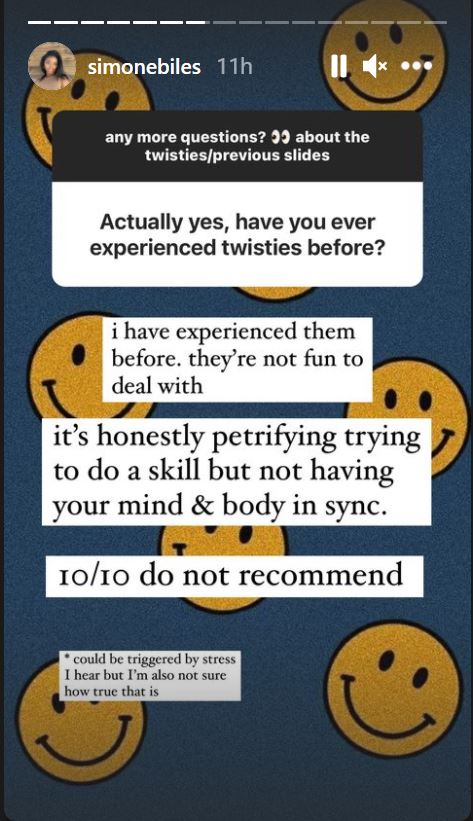Maybe Simone Biles made soaring through the air look too easy. It’s not — a fact she and other gymnasts who constantly negotiate with the laws of physics have long understood.

Every leap, no matter how routine, requires an innate sense of time and space. You have to know how many fractions of a second you have to make your body do what it needs to do. Just as crucially, you need to know you’ve got enough room to do it before the ground renders a verdict one way or another.
Simone Biles went undefeated for eight years. Gravity is forever-and-0.
Sometime after qualifying at the Tokyo Olympics on Sunday, the four-time Olympic gold medalist lost her way. She kept telling her body to twist. It kept saying, “How about no.”
The “twisties,” as they’re known within the gymnastics community, were back. And Biles knew it, leading her to withdraw from the team final after one rotation and skip the all-around final. She watched from the stands on Thursday as U.S. teammate and good friend Sunisa Lee claimed the gold.
Biles hasn’t ruled out competing in the event finals — she’s qualified for all four — starting on Sunday. Yet even a minibreak from the competition floor hasn’t cured her. During a series of social media posts on Friday, the 24-year-old provided an inside look at the “twisties.”

Get breaking National news
What are they?
The “twisties” are the sudden inability for a gymnast to make the requisite spins — or sometimes any spins — for a particular maneuver.
Biles posted a video — which she later deleted — of her doing a dismount on the uneven bars during training. She kept trying and failing to do 2 1/2 twists, just as she failed to do a full Amanar vault during the team finals on Tuesday night, coming up one full twist short, leading her to step away from the competition to protect herself.
“Sometimes I can’t even fathom twisting,” Biles posted. “I seriously cannot comprehend how to twist.”
She called it the “strangest and weirdest thing.”
Why do they pop up?
No one knows. Not even the greatest of all time. Despite some sloppy — by her unparalleled standards — moments during qualifying, Biles said the “twisties” didn’t pop up until Monday.
She’s dealt with them before. The difference this time? They’re not just affecting her on vault and floor exercise, as they have in the past. Now, they’re following her to bars and beam, too.
“It’s honestly petrifying,” she wrote, “trying to do a skill but not having your mind and body in sync.”
How long do they last?
It depends on the athlete. For Biles, they can hang around for two weeks or more, making her availability for event finals seemingly a long shot at best.
Two-time Olympic gold medal trampolinist Rosie MacLennan of Canada struggled with her own version of “the twisties” while training for the 2016 Games in Rio de Janeiro. She recovered in time to top the podium in Brazil, but only after painstakingly relearning her skills over time.
“There (are) mental pieces to all sports, but in aerial sports where you’re slipping and twisting, there’s a huge mental component,” MacLennan said Friday after finishing fourth. “And when you get lost in the air, it’s one of the most terrifying experiences you can have.”
A terror that never really fully goes away.
“It sticks with you,” the 32-year-old MacLennan said. “So it’s something that like even to this day that you second guess yourself sometimes and it just takes a lot of really diligent work and a lot of patience and a lot of support around you.”






Comments
Want to discuss? Please read our Commenting Policy first.